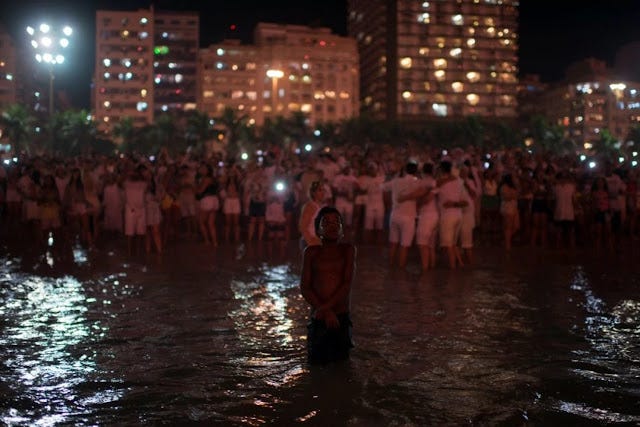Referendum showdown in Ecuador (Jan. 5, 2018)
Campaigning started in Ecuador this week, ahead of a referendum next month that will ask citizens to roll back recent reforms. Voters will be asked about seven proposals, including the elimination of indefinite reelection for political posts (presidency), restructuring of mechanism to name the electoral council, and restrictions on mining.
The vote, called by current President Lenín Moreno, is largely aimed at preventing former President Rafael Correa from running for reelection in 2021. But it is also aimed a wresting political power from his former party ally, reports the AFP. Moreno served as Correa's vice president, and campaigned as his successor last year. But since taking office the two have increasingly feuded.
Correa was scheduled to arrive in Ecuador today -- from Belgium where he has resided since leaving the presidency last year. He will campaign for a "no" vote in several of the proposals, reports El Comercio.
Forty organizations have been approved to campaign, 36 of which will be pushing the "yes" vote, reports Andes. Other proposals include forbidding people convicted of corruption from ever holding political posts again, a law aimed at limiting land speculation, reducing areas open to oil extraction, and enlarging the Yasuní national park. (TeleSUR analyzes those most questioned by Correa supporters.)
Correa supporters argue that some of the proposals are unconstitutional, and that some represent a rollback of social rights. They argue that the reelection question is aimed exclusively at preventing him from returning to office, and that the vote itself is an unnecessary exercise aimed at strengthening Moreno, reports El Comercio.
Moreno supporters, in turn, argue that the referendum is aimed at dismantling Correa's later excesses and returning to the "spirit" of the 2008 Montecristi Constitution. Popular referendums became more common under Correa, who held four throughout his presidency.
Moreno has a high approval rating of 71 percent, and will be backed by opposition parties in the vote.
The national electoral council has invited international organizations and specialized groups -- Unasur, the OAS, Uniore, and A-web -- to monitor the Feb. 4 elections, reports Efe. About 13 million voters are eligible to vote in the referendum, and participation is obligatory in Ecuador.
News Briefs
Brazil's government surprised observers by announcing a potential retreat from new mega-dam construction. The country's hydropower policy is criticized by environmental and indigenous activists, reports the Guardian. Though officials cited public concerns, critics say the drying up of construction company bribes in the wake of the Operation Car Wash investigation is a more likely reason. Climate change has also raised the costs of hydropower, and a slow economy has decreased demand. "The decline in political influence of Brazil’s gigantic construction companies caused by the Lava Jato (Car Wash) corruption investigation is likely a major cause of the change in policy," according to Mongobay. "So is the current depressed state of Brazil’s economy, which makes it unlikely that Brazil’s huge development bank (BNDES) will invest in such multi-billion dollar projects."
Peruvian defense minister Diego Nieto resigned on Wednesday, the second cabinet member to step down since President Pedro Pablo Kuczynski polemically pardoned former leader Alberto Fujimori, convicted of human rights violations, reports AFP.
Fujimori was released from the hospital yesterday, and went to his Lima home, reports the New York Times.
Children of Cubans living abroad will be permitted to apply for citizenship under new rules. But the government will be able to use political criteria -- including their parents having committed "counterrevolutionary" acts -- in evaluating applications, reports the Miami Herald.
Food shortages in Venezuela are making groceries more attractive than cash -- the Miami Herald reports that gangs are using food baskets to lure young recruits, and that "hunger crime" is on the increase.
Venezuela failed to make a $35 million payment this week, according to S&P Global Ratings, ratcheting up fears that the country will not be able to pay the $9 billion in bonds due in 2018, reports the Wall Street Journal.
Paraguayan attorney general Javier Díaz Verón is under investigation by his own office for illicit enrichment, reports TeleSUR.
A virtual reality installation by Mexican filmmaker Alejandro González Iñárritu -- Carne y arena -- gives participants a six minute experience based on undocumented migrant's crossing into the U.S. But while it's stirring and terrifying, Martín Caparrós is critical in a New York Times Español op-ed about the overall utility in raising consciousness about the dangers faced by migrants.
A photograph from New Year's Eve celebrations in Rio de Janeiro's Copacabana beach has stirred up passionate debate in Brazil about race, class, and inequality, reports the Washington Post. The shot by Lucas Landau for Reuters portrays a 9-year-old boy staring up at fireworks alone in the water, as crowds celebrate behind him. For some, he represents inequality in the country, while others question the narrative that "black" means "poor."




